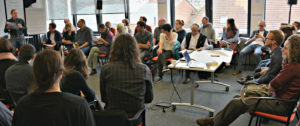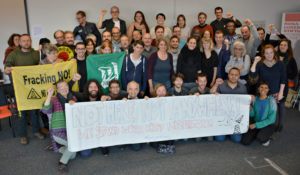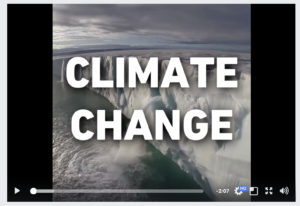 What happens if a bunch of activists working to halt gas infrastructure and raise awareness about the issues around gas meet in Brussels? A global network of “gastivists” is launched.
What happens if a bunch of activists working to halt gas infrastructure and raise awareness about the issues around gas meet in Brussels? A global network of “gastivists” is launched.
The first edition of the Brussels Gas Conference, co-organized by Food & Water Europe, was in September 2016. This year, we decided to repeat the successful conference at the end of September, this time focusing more on global supply chains of fossil gas.
Fighting the notion of gas as a bridge fuel – and fighting impacts of gas extractions
While most of the discussions around gas in Brussels concern its climate impact and security of supply as well as energy prices, the reality for people affected by gas extraction and gas infrastructure projects often looks different. In this year’s conference, representatives from EU-based organizations touched base with activists on the ground within and outside of Europe, broadening the joint narrative around gas. The Global North’s approach is to focus on the gas lobby‘s push to sell gas as green, clean and a necessary bridge-fuel supporting unreliable renewables – backed by hordes of lobbyists and huge payments for lobby material. On the other hand, participants from the Global South in particular made clear that in extracting countries, land grabbing, loss of livelihood, increase of socio-economic inequality, corruption and human rights abuse are the issues they highlight when talking about fossil gas.
Gas flows into Europe – where do we get our energy from?
 So where is the fossil gas used in Europe coming from? While Russia is still supplying the biggest share of gas imported to the EU and Norway and Algeria export the second and third biggest share to European Member States, the role of liquefied natural gas (LNG) is significant already, and expected to rise. Despite EU attempts to reduce Russian influence on the gas market, several export projects are planned there. A Russian conference participant highlighted issues around North Stream II, violations of environmental laws and the pipeline’s construction endangering protected areas and species.
So where is the fossil gas used in Europe coming from? While Russia is still supplying the biggest share of gas imported to the EU and Norway and Algeria export the second and third biggest share to European Member States, the role of liquefied natural gas (LNG) is significant already, and expected to rise. Despite EU attempts to reduce Russian influence on the gas market, several export projects are planned there. A Russian conference participant highlighted issues around North Stream II, violations of environmental laws and the pipeline’s construction endangering protected areas and species.
Another planned mega-project, aiming at providing Europe with gas from Azerbaijan, is the Southern Gas Corridor (SCG). Openly supported by the EU Commission to reduce dependence on Russia, this extremely costly pipeline will likely carry Russian gas in the end. Still, EIB/EBRD might support this mega-project financially. Their decision is expected soon. Widespread corruption, aggravation of inequality and human rights issues around gas not only relate to the SGC, but are also main issues in African countries.
Nigeria, Shell and a megalomaniac pipeline project
While Nigeria is well known for oil extraction, much of the gas reaching the surface is being flared as a by-product, making Nigeria lose gas worth $2 billion dollars – annually. Now, an offline gas pipeline from Nigeria all the way up to Morocco and further to Europe might be planned, with first sections already constructed between Nigeria, Bénin, Togo and Ghana. Activities of oil and gas companies lead in almost all cases to an increase of inequalities in countries in the Global South, with a small, privileged segment of the population profiting while the rest has to carry the impacts of extraction. British-Dutch multinational Shell, very active in Nigeria, is making no exception to this sad rule.
Importing non-ethical, environmentally dirty LNG

Other than pipelines, possible entry points for gas to Europe are the numerous LNG terminals. They link the EU to several countries, at the moment mainly traditional supply countries such as Algeria or Norway, but also Nigeria, Libya, South America and the US. Due to their flexible nature, LNG terminals can accommodate cargo from all around the globe. At the conference, activists fighting looming threats of fracking in Tunisia or South Africa, or affected by fracking in the US, met fracking opponents from the UK. There is agreement that a global LNG trade frenzy would only aggravate the situation.
Still, in the US, a host of LNG export terminals are planned. The country has been a gas net-exporter in most recent months. The strong push for LNG exports puts even more pressure on abolishing existing restrictions on gas exports, and under a “rubberstamp” approach the rush for gas infrastructure buildout is barely regulated.
While Europeans in many Member States might already cook and heat with US fracked gas, at the same time natural gas liquids (NGL) are imported as feedstock for plastics production. These NGLs used for plastics, mainly ethane, are fracked in Pennsylvania and transported through pipelines to an export terminal, posing high safety threats to nearby communities. Activists from both Pennsylvania and Scotland, where fracking and chemical giant Ineos produces shale ethane-based ethylene, met and strategized at the conference.
While it became clear during the conference that the ways gas enters the EU are manifold and entail a broad range of issues, the newly-formed “gastivist” community proves to be creative, diverse and motivated enough to stand up to the many challenges gas use still holds in store for us.


